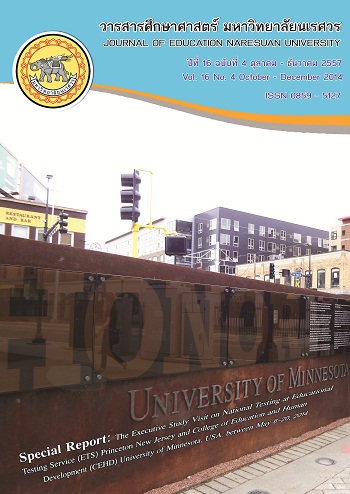รูปแบบการพัฒนาครูและผู้บริหารสถานศึกษาแบบใช้โรงเรียนเป็นฐาน ในโรงเรียนขนาดเล็ก : กรณีศึกษาของจังหวัดพิษณุโลก
Main Article Content
Abstract
บทคัดย่อ
การวิจัยครั้งนี้มีวัตถุประสงค์เพื่อ 1) วิเคราะห์บริบทโรงเรียนเกี่ยวกับข้อมูลเกี่ยวกับโรงเรียน ผู้บริหารและครู สภาพการเรียนการสอนของโรงเรียน และการบริหารโรงเรียน 2) สร้างและสังเคราะห์รูปแบบการพัฒนาครูและผู้บริหารแบบใช้โรงเรียนเป็นฐานในโรงเรียนขนาดเล็ก 3) ศึกษาผลการใช้รูปแบบการพัฒนาครูและผู้บริหารสถานศึกษาแบบใช้โรงเรียนเป็นฐานในโรงเรียนขนาดเล็ก 4) ศึกษาปัจจัยความสำเร็จในการพัฒนาครูและผู้บริหารแบบใช้โรงเรียนเป็นฐานในโรงเรียนขนาดเล็ก สถานศึกษาที่เข้าร่วมรับการพัฒนาโดยใช้โรงเรียนเป็นฐานในโรงเรียนขนาดเล็กจำนวน 5 โรงเรียน ในเขตจังหวัดพิษณุโลก ประกอบด้วยโรงเรียนวัดดอนอภัย โรงเรียนวัดวังอิทก โรงเรียนบ้านทุ่งน้อย โรงเรียนบ้านวังสาร โรงเรียนวัดเขาน้อย โดยมีหน่วยงานที่ร่วมกันพัฒนาคือคณะศึกษาศาสตร์ มหาวิทยาลัยนเรศวร และสำนักงานเขตพื้นที่การประถมศึกษาจังหวัดพิษณุโลก เขต 1 – 3 ดำเนินการวิจัยและพัฒนาตามรูปแบบที่ได้พัฒนาขึ้นจากการวิจัยระยะที่ 1 ปีงบประมาณ 2555 สำหรับการดำเนินการวิจัยครั้งนี้ประกอบด้วย 2 ขั้นตอน ขั้นที่ 1 การศึกษาวิเคราะห์บริบทโรงเรียน และขั้นที่ 2 การสร้างและพัฒนารูปแบบการพัฒนาครูและผู้บริหารโดยใช้โรงเรียนขนาดเล็ก ผลการวิจัยพบว่า
1. การวิเคราะห์บริบทโรงเรียน พบว่าครูจัดการเรียนรู้ที่เน้นผู้เรียนเป็นสำคัญอย่างเต็มความสามารถ ส่วนผู้บริหารมีภาวะผู้นำด้านวิชาการ บริหารบุคคล และบริหารงานทั่วไปอยู่ในระดับมาก โรงเรียนนำเสนอแผนยุทธศาสตร์การพัฒนาครูและผู้บริหารแบบโรงเรียนเป็นฐานที่สอดคล้องกับความต้องการเฉพาะตามบริบทของโรงเรียนแต่ละโรงเรียนที่แตกต่างกัน ร่วมกับการกำหนดแผนกลยุทธ์ของคณะศึกษาศาสตร์และสำนักงานเขตพื้นที่การประถมศึกษาในการส่งเสริมพัฒนาครูอย่างต่อเนื่อง นิเทศ ติดตาม ประเมินผล
2. การสร้างและสังเคราะห์รูปแบบการพัฒนาครูและผู้บริหารสถานศึกษาแบบใช้โรงเรียนเป็นฐานในโรงเรียนขนาดเล็ก เริ่มด้วยการดำเนินการร่วมกันโดยคณะศึกษาศาสตร์ประสานกับเขตพื้นที่การศึกษาในการการคัดเลือกโรงเรียน คณะศึกษาศาสตร์ทำหน้าที่สร้างความเข้าใจ ให้ความรู้/เสริมพลัง เอื้ออำนวยความสะดวก จัดเวทีแลกเปลี่ยนเรียนรู้ ส่วนเขตพื้นที่การศึกษาประสานให้ความรู้/เสริมพลัง นิเทศ ติดตาม และโรงเรียนขนาดเล็กจัดทำแผนพัฒนา ดำเนินการ ประเมิน/ตรวจสอบและปรับปรุงการดำเนินงาน สำหรับผลการสังเคราะห์ได้รูปแบบการพัฒนาครูและผู้บริหารสถานศึกษาแบบใช้โรงเรียนเป็นฐานในโรงเรียนขนาดเล็กที่ใช้ทฤษฎีเชิงระบบ ประกอบด้วยปัจจัยนำเข้า กระบวนการ และผลผลิต ร่วมกับการใช้กระบวนการวงจร PDCA
3. การใช้รูปแบบการพัฒนาครูและผู้บริหารสถานศึกษาแบบใช้โรงเรียนเป็นฐานในโรงเรียนขนาดเล็ก คณะศึกษาศาสตร์ได้ดำเนินการพัฒนาโรงเรียนตามโครงการที่ร้องขอจากโรงเรียน หลังจากนั้นดำเนินการประเมินความคิดเห็นของครูและผู้บริหาร ซึ่งพบว่า 1) ผู้บริหารพึงพอใจมากที่สุดต่อกระบวนการพัฒนาผลการเรียนรู้จากกระบวนการพัฒนาที่จัดขึ้น 2) ครูพึงพอใจมากต่อทักษะปฏิบัติและการเข้าร่วมกระบวนการพัฒนา สำหรับการเรียนรู้ของครูในและนอกโรงเรียนอยู่ในระดับปานกลาง 3) นักเรียนหลังร่วมกิจกรรมเกิดการเปลี่ยนแปลงในทางบวกมากขึ้น 4) ชุมชนเข้าร่วมกิจกรรมเป็นวิทยากรท้องถิ่น และให้การสนับสนุนด้านงบประมาณ
4. ปัจจัยความสำเร็จในการพัฒนาครูและผู้บริหารแบบใช้โรงเรียนเป็นฐานในโรงเรียนขนาดเล็ก พบว่า 1) นำความต้องการมาจัดทำเป็นแผนการพัฒนา 2) กำหนดนโยบาย ทิศทางที่ชัดเจนในการพัฒนาของโรงเรียน 3) ผู้บริหารมีภาวะผู้นำทางวิชาการ ความมุ่งมั่นและตั้งใจในการพัฒนาเพื่อคุณภาพการศึกษา 4) ผู้บริหารสามารถประสานความร่วมมือกับนักวิชาการ ผู้รู้ในท้องถิ่น ชุมชนในการพัฒนาครูและการศึกษาในโรงเรียน 5) ครูตั้งใจมุ่งมั่นในการพัฒนาตนเอง 6) การให้ความร่วมมือในการอบรมในการพัฒนาครูและผู้บริหารของมหาวิทยาลัย 7) การเสริมพลังการเรียนรู้ของครูและพัฒนาการเรียนการสอนในโรงเรียน 8) ความร่วมมือของของชุมชนในการพัฒนาการเรียนการสอน 9) การร่วมมือของเขตพื้นที่ในการพัฒนาและติดตามผล
คำสำคัญ : วิจัยและพัฒนา/ รูปแบบการพัฒนาครูและผู้บริหาร/ โรงเรียนเป็นฐาน/ โรงเรียนขนาดเล็ก
Abstract
The objectives of the study were to 1) analyze school context associated with the basic data of school, administrator and teachers, current situation of teaching and learning and school management 2) construct a school-based development model for teacher and administrator in small-sized school 3) investigate the effects of development model implementation 4) reveal the key success factors of the development model. There were 5 schools in Phitsanulok involved ; Don-a-pai School, Wang E-tok School, Baan Tung-noi School, Baan Wang-sarn School and Wat Khao-noi School including 2 educational institutions; Faculty of Education Naresuan University and Phitsanulok Primary Educational Service Area 1-3. The development models found in the 1st phase in 2012 have been adopted for the use in the study. The research consisted of 2 steps; the first was the analysis of school context and the other was the construction of school-based development model for teachers and administrators in small-sized schools.
Research results:
1. The analysis of school context found that teachers and administrators emphasized student-centered learning management. Academic leadership, skills of personnel administration and general administration of administrators were perceived at a high level. Based upon school context, each school proposed school-based strategic plans for the development of teachers and administrators. Faculty of Education and Phitsanulok Primary Educational Service Area worked collaboratively to promote, supervise, follow up and evaluate the school-based development of teachers and administrators.
2. A construction and an analysis of school-based development model for teacher and administrator in small-sized school started off with the collaboration between Faculty of Education and Primary Educational Service Area on selecting schools. Then Faculty of Education was in charge of building shared understanding, staff empowering, facilitating, holding knowledge sharing forum whereas Primary Educational Service Area was in charge of knowledge transferring, staff empowerment, supervising and following up. Schools were in charge of initiating plans, implementing, evaluating and improving themselves in the development process for teachers and administrators. Then, out of the synthesis of school-based development models, the model of school based development for the teachers and administrators in small-sized schools was constructed in the framework of system approach; input, process and product coupled with the cycle of PDCA process of Total Quality Management.
3. The implementation of development model: Faculty of Education conducted programs of training recommended by the schools. Satisfaction has been evaluated after the training. The results indicated that; 1) Administrators were satisfied at the highest level with the process and learning outcome. 2) Teachers were satisfied with the practical skills, program participation and model implementation at a high level; however, in-and-out school learning was at moderate level. 3) Students got the positive changes in learning behaviors and learning achievement compared to those previous semester 4) Community involved in school activities as knowledge provider and proposed financial supports.
4. Key success factors were found as follows; 1) Transforming school needs into strategic plans. 2) Determining school administrative policy and direction. 3) Administrator’s leadership, determination and commitment to quality development. 4) School administrator collaborating with university educators, local knowledge providers, school teachers and educational networks. 5) Paying attention to self-development of teachers. 6) Teachers and administrators participating in university training programs. 7) Empowering teacher’s with learning and instructional development. 8) Educational Service Area participating in school development and evaluation.
Keywords: Research and Development/ Teacher and Administrator Development Model/ School-based Approach/ Small-sized School
Article Details
The owner of the article does not copy or violate any of its copyright. If any copyright infringement occurs or prosecution, in any case, the Editorial Board is not involved in all the rights to the owner of the article to be performed.


